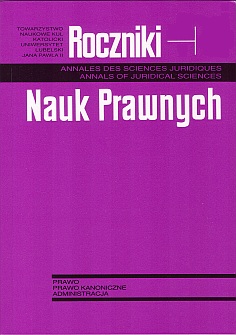Dyspensa w prawodawstwie kościelnym
Dispensation in Church Legislation
Author(s): Marek ZaborowskiSubject(s): Law, Constitution, Jurisprudence
Published by: Towarzystwo Naukowe KUL & Katolicki Uniwersytet Lubelski Jana Pawła II
Keywords: dispensation; power to grant dispensation; the subject of dispensation; the groundsfor dispensation; the effects of dispensation
Summary/Abstract: The institution of dispensation has evolved since the beginnings of the Church. It took various shapes, but its purpose has always been to slacken the law in a given case. The Church changed or mitigated the law depending on circumstances. Such slackening of ecclesiastical regulations occurred in order to make valid and decent what previously was illegal. In time, dispensation was granted prior to an act, permitteng acts previously forbidden by virtue of Church regulations. Each law is made to promote common good. However, each community consists of individuals who may find a given law too oppressive under certain circumstances and causing harm or hampering the attainment of greater common good. Dispensation is intended to relieve such situations. It is a corrective norm in cases where natural rightness calls for a competent authority to suspend the effectiveness of a given ecclesiastical provision. The article presents the evolution of the institution of dispensation in the history of the Church. It discusses the premises upon which the Church legislator slackens the law in selected cases and the effects that such dispensation brings.
Journal: Roczniki Nauk Prawnych
- Issue Year: 22/2012
- Issue No: 2
- Page Range: 75-87
- Page Count: 13
- Language: Polish

